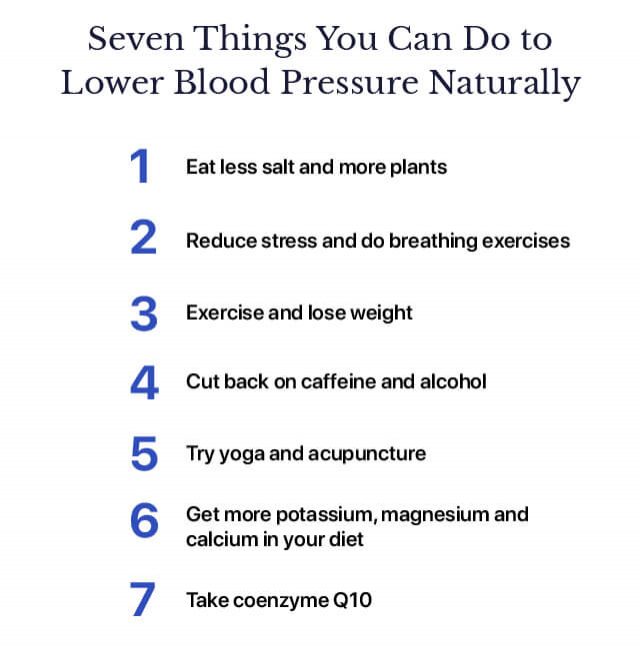
High blood pressure, or hypertension, is a common health issue that can lead to serious health complications if left unmanaged. While medications can help control blood pressure, there are also effective natural ways to lower it without relying on medication. Adopting these lifestyle changes can help you manage your blood pressure naturally, improving both heart health and overall well-being.
1. Adopt the DASH Diet
- Explanation: The Dietary Approaches to Stop Hypertension (DASH) diet focuses on foods that are low in sodium and rich in nutrients like potassium, calcium, and magnesium, all of which can help lower blood pressure.
- What to Eat: Emphasize fruits, vegetables, whole grains, lean proteins, and low-fat dairy products. Limit red meat, added sugars, and high-salt foods.
2. Exercise Regularly
- Explanation: Regular physical activity strengthens the heart, making it more efficient at pumping blood and lowering blood pressure.
- How to Exercise: Aim for at least 150 minutes of moderate aerobic exercise, such as brisk walking, cycling, or swimming, each week. Strength training exercises can also be beneficial when done twice a week.
3. Reduce Sodium Intake
- Explanation: Excess sodium causes the body to retain water, which increases blood volume and pressure on the arteries.
- Tips: Opt for fresh foods and avoid processed foods that are often high in sodium. Season meals with herbs and spices instead of salt. The American Heart Association recommends keeping sodium intake to less than 2,300 mg per day, and ideally closer to 1,500 mg.
4. Increase Potassium-Rich Foods
- Explanation: Potassium helps balance sodium levels in the body, reducing strain on blood vessels.
- Potassium Sources: Incorporate foods like bananas, oranges, spinach, potatoes, and avocados. These foods are high in potassium and help regulate blood pressure naturally.
5. Manage Stress Effectively
- Explanation: Chronic stress can lead to temporary spikes in blood pressure and may contribute to long-term hypertension if not managed.
- Stress Management Techniques: Try mindfulness meditation, yoga, or deep breathing exercises to calm the mind. Engaging in hobbies, spending time with loved ones, or even just taking a walk in nature can also help reduce stress.
6. Limit Alcohol Consumption
- Explanation: While moderate alcohol intake can have some health benefits, excessive drinking can increase blood pressure.
- Recommendation: Limit alcohol to no more than one drink per day for women and two for men. Consider having alcohol-free days during the week to further support your heart health.
7. Lose Excess Weight
- Explanation: Excess weight puts strain on the heart, which can raise blood pressure. Losing even a small amount of weight can make a big difference.
- How to Lose Weight: Focus on a balanced diet and regular exercise. Avoid crash diets and instead aim for gradual, sustainable weight loss by eating nutritious meals and maintaining an active lifestyle.
8. Quit Smoking
- Explanation: The chemicals in tobacco can damage blood vessel walls, increase the risk of plaque buildup, and raise blood pressure. Smoking cessation has immediate and long-term benefits for blood pressure and overall cardiovascular health.
- Tips for Quitting: Seek support from friends, family, or professionals. Consider joining a smoking cessation program or using nicotine replacement therapies under medical supervision.
9. Get Quality Sleep
- Explanation: Poor sleep quality can contribute to high blood pressure and make it difficult for the body to regulate stress and metabolism.
- How to Improve Sleep: Aim for 7-8 hours of quality sleep per night. Establish a regular sleep schedule, create a relaxing bedtime routine, and minimize screen time before bed. Address any potential sleep disorders, such as sleep apnea, with a healthcare professional.
10. Try Natural Supplements (with Caution)
- Explanation: Some natural supplements, such as garlic, fish oil, and magnesium, may have a positive effect on blood pressure when combined with a healthy lifestyle.
- Caution: Before starting any supplement, consult with a healthcare provider to ensure it’s safe for you, especially if you’re already taking medications.
11. Drink Herbal Teas
- Explanation: Certain herbal teas, like hibiscus tea, have been shown to help lower blood pressure due to their antioxidant properties.
- Recommendation: Enjoy a cup of hibiscus, green, or chamomile tea daily. Avoid caffeinated teas if you’re sensitive to caffeine, as it can raise blood pressure in some people.
12. Monitor Blood Pressure at Home
- Explanation: Keeping track of your blood pressure at home helps you understand how lifestyle changes are affecting it and gives you a sense of control over your health.
- How to Monitor: Invest in a reliable blood pressure monitor and record your readings regularly. This helps you and your doctor track progress and make adjustments as needed.
Conclusion
Lowering blood pressure naturally involves a combination of dietary changes, regular exercise, stress management, and other healthy habits. By adopting these lifestyle modifications, you can significantly reduce your risk of hypertension-related complications and enjoy a healthier life. Remember to consult with your healthcare provider before making significant changes, especially if you have pre-existing health conditions. Through consistent effort, you can manage your blood pressure naturally and improve both your heart health and overall well-being.
Staying proactive with these natural approaches helps protect your heart, support a healthy blood pressure range, and pave the way for a longer, healthier life.

